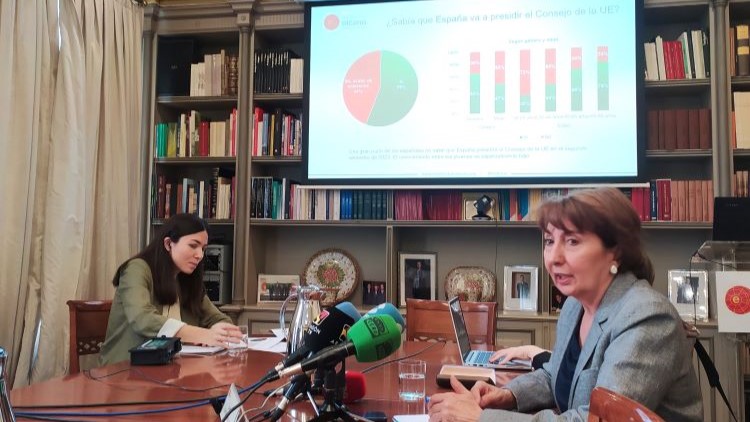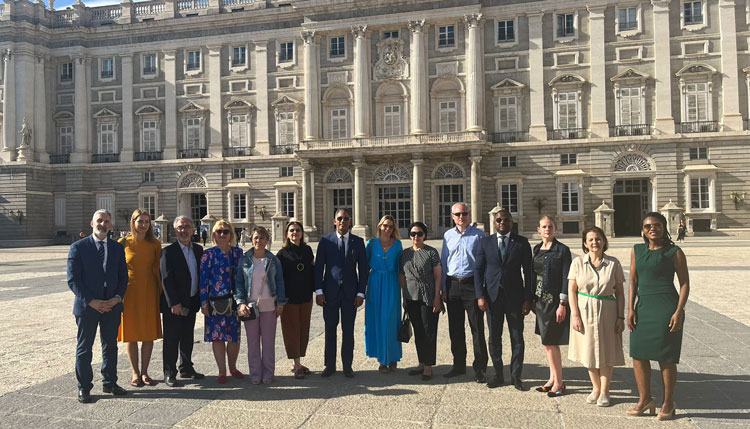Eduardo González
Spanish public opinion continues to be very pro-European, but, at the same time, it has a “great lack of information” about the functioning of the European Union to the point that almost half of our compatriots, 44%, even ignore that Spain is going to assume the Presidency of the Council of the EU this year.
This is what emerges from the forty-third wave of the Barometer of the Elcano Royal Institute (BRIE), elaborated between February 14 and March 8 of this year among a representative sample of the general Spanish population (one thousand people from the 17 communities and the two autonomous cities) and which was presented yesterday at the headquarters of this think tank in Madrid. The BRIE, whose first edition was presented in November 2002, gathers opinions, values and attitudes of Spaniards towards international relations and Spain’s foreign policy in all its breadth.
According to the report, Spaniards continue to have “great faith in the EU” to the point of trusting European institutions (European Commission and European Parliament, with ratings of between 5.7 and 5.4 out of ten, respectively) more than their Spanish counterparts (Government and Congress of Deputies, 4.8 and 4.4). Therefore, as surveys usually point out, including those of the Elcano Royal Institute and the Eurobarometer, “Spaniards are particularly pro-European”, as Carmen González Enríquez, senior researcher in the area of Public Opinion and author of the BRIE together with José Pablo Martínez Romera, stated during the event.
However, this Europeanism of Spaniards coexists “with a great lack of information” about the EU, according to Elcano. Almost half (48%) of those surveyed acknowledged that they did not understand how the EU works or only half understood it. An example of this is that only 28% knew the name of the president of the European Commission, Ursula von der Leyen.
“It is true that the EU does not make it easy, that the EU is not easy to understand,” admitted Carmen González. However, she warned, “it is important that the European institutions do much more outreach about what they are, what they do, what their relevance is” because “it is not enough to be pro-European, we should also know what we are talking about”. This responsibility, in her opinion, should be the responsibility of both European and national institutions. “To improve internal democracy, Spaniards should know which decisions of our country’s politicians come from agreements in the EU,” she said.
Curiously, the lack of knowledge about the EU is especially low among the younger populations, which is explained, according to the researcher, because the older generations “lived part of their adult life in Spain before joining the Union and, therefore, know the difference between being inside and being outside”, while the younger generations “do not know how to differentiate one from the other because they have already developed their adult life within the EU”.
A particularly significant fact about this lack of knowledge of the EU is that, according to the BRIE, a significant proportion of Spaniards surveyed, 44%, acknowledged that they did not know that Spain will preside over the EU Council in the second half of the year. This percentage, in line with the above, is especially low among those under 29 years of age (only 28% know), compared to 76% of those over 65 years of age. “Perhaps there is not enough pedagogy, but it also indicates a general lack of interest in the EU,” explained Carmen González. In any case, only 28% of those surveyed (“coincidentally, it coincides with 28% of those who know Von der Leyen,” warned the researcher) know what the EU Council, the rotating presidency body that Spain will preside over between July and December of this year, is all about.
Spanish priorities
The BRIE also reveals that, for Spaniards, the main objective of the country’s foreign policy should be “securing energy supply”, which reveals the “great concern caused by the shortage and rise in the price of some fuels, and the impact of this on inflation”. This priority has even displaced from first place the fight against climate change, which, for years, has been indicated as the first objective for Spanish foreign policy.
As for the EU’s major challenges, respondents put the war in Ukraine in first place, followed closely by rising prices, social inequality and poverty. In this case, climate change has also been relegated from first to fourth place among European priorities. In any case, and despite support for Ukraine and the perception of Russia as a threat, only a very small minority of Spaniards consider military autonomy as one of Europe’s priorities (3%), far below energy autonomy (56%), in line with this concern about the cost of electricity and fuel.







